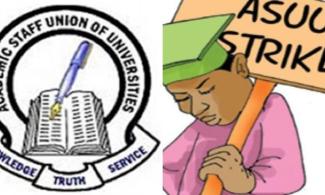
University workers under the aegis of the Academic Staff Union of Universities (ASUU) only recently called off their eight months’ strike. The lecturers asked for improved funding of universities among other demands.
The Committee for the Defence of Human Rights [CDHR] has explained how the recent strike action embarked upon by university lecturers influenced the high rate of migration of skilled Nigerians and scholars to foreign countries.
University workers under the aegis of the Academic Staff Union of Universities (ASUU) only recently called off their eight months’ strike. The lecturers asked for improved funding of universities among other demands.
However, the CDHR National President, Dr. Osagie Obayuwana during the organisation's annual general conference in Lagos said the rate of migration has indeed multiplied lately.
He said this time, it is not just desperate young men and women willing to do any jobs that are leaving, but professionals such as medical doctors, pharmacists, nurses, physiotherapists, lawyers, engineers, and so on.
He said, “These are highly skilled assets of Nigeria, trained at great expenses from the public and private purse, who are being poached to supplement and meet the high-level manpower shortfalls of countries otherwise described as developed.
“This massive loss of manpower within the period under review has been worsened by the poor management and handling of the industrial action embarked upon by the Academic Staff Union of Universities (ASUU) which lasted 8 clear months out of the year.
“Yes, by a manipulative stratagem that placed the striking lecturers in confrontation with the might of the Judiciary, lecturers were forced back to their classrooms in an orgy of involuntary servitude that only reminds one of the era when the enslaved were compelled to produce under the lashes of the slave master’s whip.
“At the same time, the issues raised by the striking lecturers bordering on the salvation of Nigeria’s tertiary educational system remain unaddressed.
“It is said that the universities have been reopened, but under circumstances where depression and lack of motivation reign supreme on the part of the academic and non-academic staff and students, even going as far as the university management cadre, where over-centralisation has made nonsense of the clamour for autonomy and academic freedom.
“Perhaps, it is only now that the universities have been reopened that the census can be taken of how many professors and senior lecturers the university system and the nation has lost these past 8 months. Undoubtedly, even the way the strike came to an end will contribute to Nigeria continuing to lose its best brains.”
The group described the government’s refusal to yield to university autonomy as mirroring “the similar call for decentralisation of the police force and the abrogation of the lop-sided distribution of legislative powers between the so-called Federal Government and the state governments at the expense of greater efficiency and meeting of obligations to the populace”.
Obayuwana also blamed the security challenges facing the nation as one of the reasons behind the high migration of Nigerian nationals in search of greener pastures.
He continued: “In addition to the above, we know that the scourge of insecurity of lives and property in all parts of Nigeria has been at its lowest ebb, perhaps at no other time in the history of the country has it been this bad; not even during the civil war era.
“We wonder whether the National Bureau of Statistics is going to be able to measure the derelictions consequences of this state of insecurity on Nigeria’s economic fortunes.
“Unemployment levels have never been this high and inflation rates are the worst in the history of our country. Millions of Nigerians can no longer afford nutritious food or medication that can keep them alive.
“The exchange rate between the Nigerian currency and major currencies of the world had never been this high which cheapens the value of labour and everything in Nigeria. All these interrelated challenges reinforce each other in a way that makes life meaningless for the average Nigerian citizen who by no stretch of imagination can enjoy the social and economic rights so richly deserved.
“Outside the invasion of Kuje Prison and release of hundreds of terrorists, we hear that the Buhari Presidency yielded to the bargaining of releasing of terrorists in custody in various parts of the country, to achieve the release of the victims of the Kaduna/Abuja train hijack. We have so far waited in vain for the Presidency to refute this.
“It clearly does not appear that Nigeria is going to witness the trial of any terrorist in the lifetime of the Buhari government.
“Meanwhile in some parts of Niger State hapless farmers are being compelled to pay taxes to bandits, for them to be allowed to harvest their crops. How terrible and shameful.
“The cabal that profits under the subsidy scam continues to milk the pockets of the Nigerian People dry by their deliberate conspiracy against the functioning of the Nation’s refineries, they have been assured of trillions of naira in the coming months.”
The CDHR also lamented the theft of Nigeria’s crude oil on a daily basis “through huge pipelines that go several kilometres beyond Nigeria’s coastline into the high seas, comparable to the catch me if you can game of ‘handkerchief taking.’”